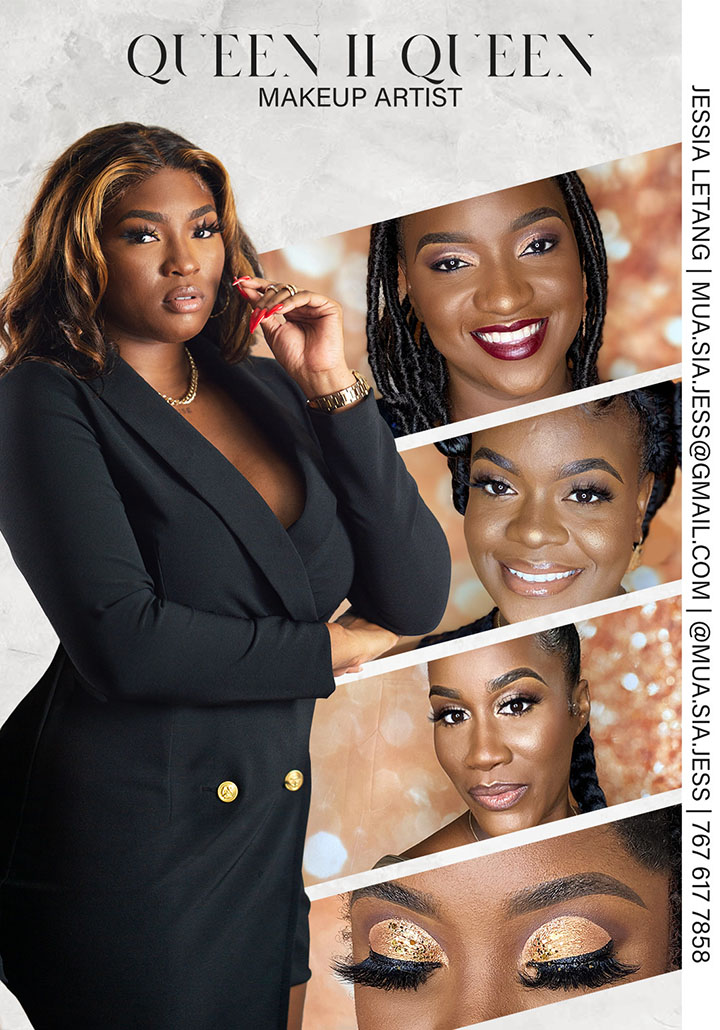
Leave a Reply
Browse
News collects all the stories you want to read
-
 Beauty & Style
Beauty & Style -
 Business
Business -
 Culture
Culture -
 Current Affairs
Current Affairs -
 Entertainment
Entertainment -
 Health & Wellness
Health & Wellness -
 People
People -
 Poetry & Prose
Poetry & Prose -
 Politics
Politics -
 Sports
Sports -
 Youth & Education
Youth & Education
-
 eMAGE is a subsidiary of Image Plus PR and the publishers of eMAGE.
eMAGE is a subsidiary of Image Plus PR and the publishers of eMAGE. Recent Posts
- Calypso is big man ting!January 27, 2023
- DOMESTIC VIOLENCE-A SURVIVOR'S PERSPECTIVEJanuary 17, 2023
- Calypso is big man ting!
eMAGE Exclusive Mail











It is 2:35 A.M. and I am sitting here scribbling in the dark because I do not want to lose the story that is playing in my head. I am convinced that there has never been a story written that did not start in the mind of an insomniac, somewhere in the wee hours. More often than not, my own stories play out like movies in my head, like scripts that I know have no real chance of being published, always incomplete, the endings stolen by the old familiar call of sleep when it finally approaches. And yet, I indulge because an artist is sometimes meant to keep her musings in her head. But not tonight.
In tonight’s episode, I am relishing my calypso high. It has come with me to lay under my covers and waits with me patiently for sleep to arrive. In heavy rotation is Who Have Have, Who Doh have doh have, and the catchy line “only in de commonwealllltthhh’. They haunt me in the way that you will understand if you have ever had a tune stuck in your head that you cannot get rid of. But most prominent on the playlist is Tasha P’s ‘Calypso High.’
Anyone who knows me will likely know that my four seasons are Summer, Birthday, Christmas and Calypso. After all, my parents named me ‘beautiful melody’ sealing my fate to be forever tied to a musical symphony and the rest is history.
Anyhow, as a calypso lover, I have reached a point where I find it hard to ignore what I see as rampant and normalized inequity in the art form. Now, before I go any further, I am going to pause to give you a minute to stop reading right now and provide an opportunity to exit if you are a traditionalist, bound by religious and paternalistic principles, because the rest of this may offend your finely nurtured sensibilities. I would hate to have to come back to tend to your little wounded ego because you think this is about you. If you are going beyond this point, please sign my waiver, that you acknowledge that nary was an unsolicited opinion, such as this, shared that did not illicit criticisms, rebuttals, or defenders galore but I will neither be swayed nor deterred by any of those. So if you are willing to hear me out, let’s go.
It took me a kaiso beat to realize that the reigning monarch, Queen Tasha P, is not being heralded as the defending monarch this year. Like many calypso fans just happy to see the return of kaiso in its full glory, I never stopped to question Tasha’s participation in the quarter finals until I had a light bulb moment when an announcer called Jaydee the defending kasio king. Not trusting the first thought that suddenly came to mind (Jaydee did not win last year) I reached out to Kaiso Parros anonymous, my trusted source for everything kaiso – because we are experts in our own rights – (did you hear it? That was the sound of our horn – toot, toot). Well ladies, gentlemen, non- binary and folks in between – that is where the tory started. Apparently Tasha P has been completely disregarded as the 2022 calypso monarch and has been relegated to the ranks of virtual kaiso monarch, a title that apparently expires within 24 hours of receiving it. You see, the competition that we all witnessed last year, was evidently, get ready for it… not real. In essence, the work and contributions of artists including Tasha P, who won, is not legitimate because it was an amended version of calypso finals. It is like it never happened, and since there are no plans to host another virtual calypso competition, her victory will have no real place in history and she will never have a chance to defend the version of the crown that she won.
Now, we can go down the road of ridiculous pleasures to explore this fundamentally flawed idea of diminishing Tasha’s accomplishment by calling her a virtual monarch when there was indeed a live audience present. And, we could also explore whether there was an understanding, formal or informal, among participants of last year’s show, when they showed up to help keep the art form alive despite the uncertainties created by Covid-19, that the winner would, following the competition, be virtually erased (pun intended). However, since I also have the lyrics of Queen Patrice Roberts in my current ‘can’t catch sleep tonight’ playlist,” Doh hold me back, ah feeling real slack’, I am choosing to centre my commentary on what I think is the root cause behind why the Queen is never proclaimed in her own home.
“Calypso is big man thing” and it is clear to see that this sentiment permeates every level of calypso, from the association and the unequal distribution of power, to the calypso culture and how it influences interrelations among calypsonians, and even in media broadcasting and calypso commentary. One only has to listen to a single calypso broadcast to hear the deference to past monarchs. King Dice, King Hunter, King Daddy Chess and so on. They are rarely ever introduced without the added context of their previous wins, and there appears to be no expiry date on this. Interestingly, Tasha is rarely introduced with her commendation added before her name. A few may acknowledge her in this way but it is far from the norm as with the male monarchs. Even on the night of Tasha’s first victory, I recall an animated kaiso fan declaring that she couldn’t be Queen because we already had one of those, referring to the Miss Dominica pageant winner. While this can be dismissed as a matter of semantics, the sentiment that it feeds is one that is indifferent not just to Tasha but to any future female monarch.
You can’t keep a good woman down though, and when it is woman time nobody can stop it. And so, it seems, in spite of it all, Tasha P has continued to excel in the kaiso arena, even taking her talents regionally on multiple occasions, holding her own against calypso giants like Terri Lyons.
I’ve read and listened with amusement some of the comments about Tasha P’s 2023 calypso including considerations about whether she should have advanced to the next round of competition. Imagine people who claim to understand and appreciate calypso repeating certain sentiments as though it originates from a calypso handbook that only they have access to. Some have said that Tasha’s song cannot even be categorized as calypso. My basic understanding of what make a calypso melody, leads me to think otherwise. It has a 4/4 rhythm, bass drum and snare come in at the right time to create the foundation of a basic kaiso cadence, a story is told that is both relevant and topical, so what criteria of calypso is it not meeting exactly? It is also interesting that I can actually pinpoint more than one song entered into the contest that have Reggae, Raga soca and even some Pop/r&b scores but no outcry seems to surround these entries.
As a calypso fan, I give great accommodation to those who express the sentiment that perhaps in comparison to some of her past work, this may not be her strongest but this does not mean she should be relegated to the bottom of the pack by any means. The overall concept is one that any calypso lover can relate to. Few things can raise your pores, relax you, make you laugh, bring out your inner lavway, set you on fire or put you in the know like a good calypso. The concept of a calypso high is therefore a nostalgic feeling that I can relate to and I am sure many others can also. The only issue I see with this song is the construction of some of the verses. Some of the ideas incorporated such as the mention of the recent GBV incidents feel out of sync with the overall idea of celebrating a kaiso high. In that regard it impacts the song’s ability to fully propel the listener to that zone where they can feel and embrace the central theme. In my opinion it is still early days and there is time to address this if the writer is willing to go back and make a few small tweaks to the lyrics.
My general take on the criticisms surrounding Tasha P, this year, and perhaps every year since she joined the calypso arena, is one that carries through to the other women who have come and gone in Dominican calypso. It feels like a place where women come to stay a while but not for a long while. They appear to be but visitors in a space where they are merely tolerated but never treated as equals who have a right to compete on their own merit. It is a shame to witness this crop of Kaiso Queens existing inside an institution that is run by and set up for male dominance at every turn, even with a female Vice President.
And while I am at it, this institution also appears to uphold blatant homophobia. In this year’s competition, there is at least one entry that is gaining more and more popularity each week that includes lyrics that are both homophobic and misogynistic. Our esteemed reviewers and commenters of kaiso have yet to address this. The underlying fabric of our society is shaped by ideals that are steeped in paternalistic, colonialized and religious rhetoric. We have been socialized to think that all that goes with it is normal including how rules are applied differently to men and women. In 2023 we are still ok to chant “watch your bottom for the carnival” even though most of us know enough to understand its openly homophobic lyrics and the problematic misinformation about HIV transmission. So much for knowing better and doing better.
Before any of those thin skinned Association members come for me, I would like to invite them to redirect their energies to fixing up the mess that is packaged for ‘we de kaiso parros’ year after year. We keep returning with our patronage and enthusiasm for the love of the culture. But for how long can we sustain participation if there is no acknowledgement that a changing of the guard is required? There needs to be a more tolerant, inclusive and innovative framework for calypso to grow. Maybe it will happen the next time we have a virtual kaiso monarch competition and finally Queen Tasha P will have the honour of defending her “crown.”
Niambi Martin-John
Niambi is a social change champion, community mobilizer, advocate, author and fund development specialist who has dedicated her career to increasing capacity for marginalized, racialized and at-risk communities. Niambi strongly believes that we all have a responsibility to drive change, end stigma and eliminate barriers so that all people have equal access to power and personal agency. As such, she uses her access to mentor and guide emerging social sector professionals as a professor in a Non Profit Leadership Management Post Graduate program. She currently works as a Director of Development with an organization committed to delivering resources directly into the hands of the community-based organizations (CBOs) that are turning the tide of HIV & AIDS in sub-Saharan Africa.More from Commentary
DOMESTIC VIOLENCE-A SURVIVOR’S PERSPECTIVE
Domestic Violence, also known as 'domestic abuse' or 'intimate partner violence,' is described as a series of behavioral patterns used …
NOTES ON GRIEF
Last night, I had a panic attack… heart racing, tears flowing, full blown panic attack. I had lost my balls. No, …
REVIEW: Choral Harvest- A Sisserou Singers Triumph!
The Sixth Form Sisserou Singers (SFSS), a cultural institution in its 27th year, is showing signs of reinvention and growth. The …